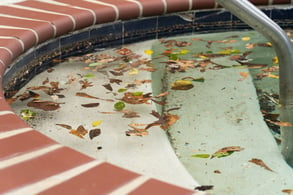 Ah, Louisiana, where the state tree might as well be the "ever-shedding leafy." It's a beautiful place renowned for its lush, green landscapes that could swoon any nature photographer. Yet for those who own a residential pool in Louisiana, these same picturesque trees often become the bane of their existence.
Ah, Louisiana, where the state tree might as well be the "ever-shedding leafy." It's a beautiful place renowned for its lush, green landscapes that could swoon any nature photographer. Yet for those who own a residential pool in Louisiana, these same picturesque trees often become the bane of their existence.
There are particular times of the year in Louisiana when these trees decide to redecorate the landscape by shedding their leaves liberally—mostly into your pool, it would seem. As any pool owner can attest, these leaves aren't just falling but launching a full-scale invasion. This messy situation means that a good chunk of your leisure time is spent on a never-ending chore: skimming leaves out of the pool. And just when you think you're done and can admire your clean pool, look again. In no time at all, it's as if you've never skimmed at all. Indeed, these leaves are the "gift that keeps giving." They not only take a physical toll on the poor soul tasked with pool maintenance but also wreak havoc on your pool's water chemistry.
Leaves and debris left in the pool can significantly impact its cleanliness and functionality. Common types of debris that can accumulate include fallen leaves, branches, grass, and insects. When left untreated, this debris can cause various issues, from reducing the effectiveness of your filters and skimmers to throwing off your pool's water chemistry. This can result in imbalanced pH levels, decreased sanitizer effectiveness, discoloration, and odors.
Leaves Increase Organic Load and Escalate Algae Growth
As leaves and debris break down in the water, they introduce organic compounds and nutrients. This influx becomes a feast for bacteria and algae, which thrive on such organic matter. The result is a rapid spike in biological activity within the water. As the organic load increases and chlorine levels decline, the risk of an algae bloom escalates. Algae, once they take hold, can rapidly spread, turning your once-clear water into a murky green mess. This rapid spread underscores the urgency of the situation and the need for immediate action to prevent further deterioration of water quality.
Chlorine Demand Increases
As bacteria and algae thrive in the water, the demand for sanitizers like chlorine skyrockets. The existing chlorine in the water is swiftly consumed as it battles to keep up with the growing microbial population. This increased demand can rapidly deplete chlorine levels, leaving the water susceptible to more harmful bacteria and algae growth. Hence, it's crucial to regularly check chlorine levels and add them as necessary to ensure the water remains clean, safe, and healthy.
Excess Leaves and Debris Create Chemical Imbalances
When there is an excess of organic matter in the water, it can significantly disrupt the delicate chemical balance. This imbalance not only compromises the effectiveness of chlorine but also creates an environment where other water chemistry parameters, such as pH and alkalinity, are prone to fluctuation. Excess organic matter facilitates the growth of microorganisms, which can significantly impact water quality and pose a potential risk to human health. Therefore, it is crucial to maintain a proper balance of water chemistry parameters to ensure that the water remains safe for use.
Water Discoloration Due to Tannin Release
When leaves decompose, they break down and release tannins into the water. Tannins are organic compounds in many plants, including leaves, bark, and fruits. They are responsible for the brownish color that is seen in tea. When tannins come into contact with water, they can cause the water to turn brown or yellow, which can be pretty unsightly when it happens in a pool or spa. In addition to discoloration, tannins can contribute to an unpleasant odor in the water, which can be especially problematic in spas, where the water is heated and the odor can become more noticeable. The odor can be challenging to remove, even with regular cleaning, and can detract from the overall experience of enjoying your pool or hot tub.
Proactive measures are essential to combat these issues and maintain pristine water quality. Regular pool maintenance is not just a chore but a vital step to keep your pool or hot tub in optimal condition and prevent the adverse effects of leaves and debris. Skimming leaves between pool cleanings, emptying skimmers often, and establishing a routine maintenance schedule ensures that leaves and debris are promptly removed from the water surface, preventing them from accumulating on the pool floor, steps, or ledges, which could lead to issues. By staying vigilant and taking prompt action, you can ensure that your pool or hot tub remains a refreshing retreat for relaxation and enjoyment.

